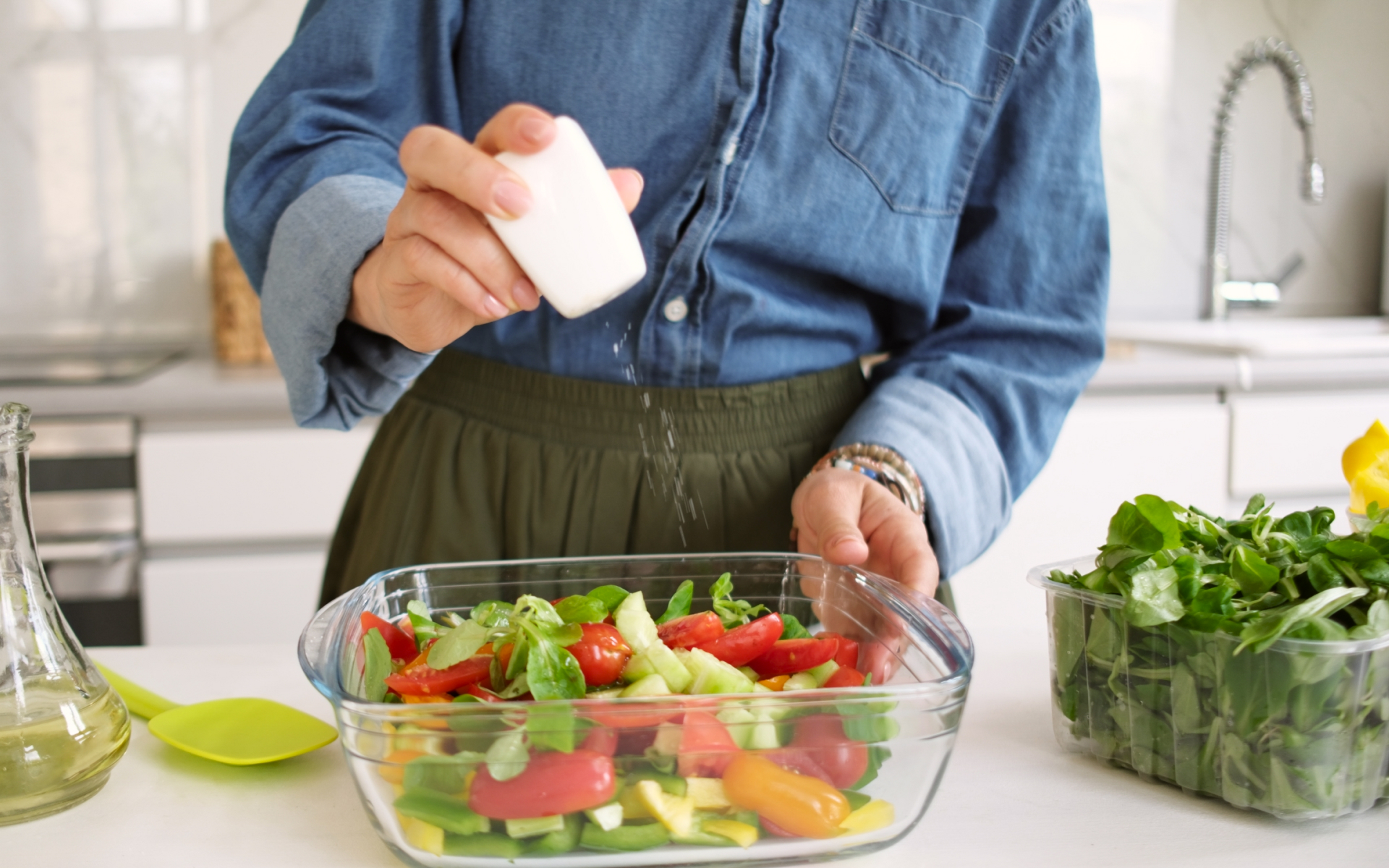“Can I use stevia while fasting?” is the correct question to ask if you’re fasting to achieve health benefits such as cellular repair, ketosis, a stronger immune system, or weight loss. Can you safely use stevia without disrupting the processes that benefit you?
Let’s see why you can use it in moderation and how it interacts with your body. Stevia may be one of the few ways to soothe a sweet tooth without getting into trouble with your fasting goals.
Is it OK to Use Stevia While Intermittent Fasting?
Can I use stevia while fasting? Here’s a fast rundown of why you can:
- Stevia has no calories and 1 g of carbs (14)
- Your body can’t digest its unique carbs (18)
- Stevia can help regulate glucose/insulin levels (11)
- It can be used to safely aid weight loss (10, 25)
- There are easy guidelines showing you how much to use (18)
- Pure stevia extract without additives is useful when fasting (16, 25, 26)
- Stevia doesn’t supply enough calories or carbs to stop ketosis (1, 20, 7)
- It allows you to enjoy black coffee and tea while fasting (7, 20, 22)
- Stevia doesn’t stop autophagy if it is used in very small amounts (13)
Let’s see why stevia is safe and what may make it an issue for some people.
BetterMe is your fast-track ticket to a long-lasting weight loss! Tailor your fitness journey and maximize your results with just a couple of swipes!
Can I Use Stevia While Fasting?
Let’s understand what stevia is, how it affects your body, and some benefits before showing you whether it interferes with fasting.
What Is Stevia?
Does stevia break a fast? WebMD calls stevia a non-nutritive plant that contains no calories, carbs, or added ingredients in its most organic form and is 200-400 times sweeter than table sugar (16). It’s a derivative of the Stevia rebaudiana leaves that are native to South America, but it has been commercially used in Japan since the 1970s (18).
Steviol Glycosides and Antioxidants
The FDA does not approve of the use of stevia’s raw leaves, but states that the glycoside extracts are safe for use (16). Only products with the words “stevia extract” or “Stevia rebaudiana” are good for human consumption. High-purity leaf extract contains 95% steviol glycosides, with the following (18):
- Rebaudioside A, B, C, D, and E
- Rubusoside
- Steviolbioside
- Stevioside
- Dulcoside A
Steviol glycosides are practically indigestible, which explains why this sweetener is zero-calorie (18). These glycosides remain intact through the small intestine, only breaking down slightly in the colon to send steviol glucuronide to the liver, which leaves the body in your urine or feces. Your body doesn’t metabolize glucose or energy from glycosides.
Stevia Benefits
Stevia has the following potential health benefits when used in the right amount:
- Iranian research showed that Stevia doesn’t affect glucose, insulin, glycosylated hemoglobin (HbA1C), or lipid levels in patients with type II diabetes (11). It’s a safer sugar substitute for diabetics and those who want to keep their insulin levels stable.
- The University of Manchester found that daily Stevia use helps individuals manage their weight, fight against obesity, and decrease overall caloric intake (10). Stevia may help with weight loss during intermittent fasting but can also reduce energy levels.
- Medicine Net suggests that stevia’s glycosides may help lower blood pressure by widening your blood vessels (25). However, this finding is not well established as the consumption of stevia may have a negative effect if you have hypotension. You should consult a healthcare provider first.
Stevia Recommendations
The Joint FAO/WHO Expert Committee on Food Additives published an acceptable daily intake (ADI) of 1.8 mg per pound (4 mg per kilogram) of body weight of stevia daily (18). Using more than this could cause nausea, bloating, abdominal fullness, dizziness, numbness, muscle spasms, and allergic reactions (25).
A pinch of stevia powder or 5-7 liquid stevia drops is enough for one serving. The drops will give you 20-50 mg of stevia per serving. The exact amount varies for each brand, but high-purity stevia should align with these serving suggestions. Finally, check the upcoming tips to learn what you may want to avoid.
Read more: Green Tea Intermittent Fasting: Benefits and Side Effects
What Sweeteners Can You Use While Fasting?
Stevia may be ideal for intermittent fasting if it is used as directed and if the product only contains stevia extract or Stevia rebaudiana (16). Added ingredients are likely to make stevia unsuitable for ketosis and fasting. For example, sucralose is a sugar that is not suitable for those who are fasting or on a ketogenic diet.
Added ingredients may also contain sugar alcohols, which you will want to avoid as they contain calories and carbs that may break a fast. Sugar alcohols include Erythritol, Lactitol, Maltitol, Mannitol, and Xylitol. Read the nutrition label to know whether you’re using stevia products that are right for you.
Other additives you should avoid include dextrose and maltodextrin. WebMD says that dextrose is simply another form of added sugar (27). At the same time, maltodextrin is a refined, processed powder that is added to sweeteners and offers no nutritional value, only carbs (26).
How Stevia May Make You Crave Sugar
How could a zero-calorie sweetener make you crave sugar? A French study may have the answer to your question, as it examined the mechanisms of sugar addiction (19). This study found that eating sugar may be as addictive as using cocaine, and it rewards your brain every time you eat more, which causes the body to crave more.
Unfortunately, eating stevia tricks the brain into believing you have eaten sugar when you haven’t consumed any digestible calories. Therefore, your brain may signal the desire for more sugar or carbohydrates until it realizes the sweetener doesn’t produce any glucose or calorie spikes.
Does Stevia Cause Cancer?
Unfortunately, a myth involving stevia may turn some people off of this sweetener. It contains a flavonoid called Kaempferol (17). This has antioxidant, antibacterial, antifungal, and anti-inflammatory effects all of which have beneficial properties for the body.
A recent Frontiers review explained how Kaempferol shows promising results in the fight against neurological disorders and various cancers, such as pancreatic cancer (23). So stevia doesn’t cause cancer, it can actually help reduce your risk.
Does Stevia Break Ketosis?
First, you need to understand ketosis to know why stevia can’t break it. Baylor University explains that ketosis is the process of depriving your body of glucose energy until it turns to the body’s fat stores and the liver to produce beta-hydroxybutyrate ketones (12).
Furthermore, ketones lower your insulin levels, which encourages the body’s fat stores to release fatty acids for energy as glucose is depleted (12, 14). Similarly, ketones can efficiently cross the blood-brain barrier to provide plenty of energy for mental processes.
Ketosis allows you to consume a maximum of 30-50 grams of carbohydrates (1). The USDA has shown that one gram of stevia typically only has 1 g of carbs (20), so it doesn’t include enough carbohydrates to end ketosis.
Secondly, low to zero-calorie drinks on fasting days won’t break ketosis (7, 20). Calories from carbohydrates, starches, and sugars all increase glucose levels (9). Ketosis only occurs when glucose stores run dry, which means that a glucose spike will end ketosis (12).
Can I Drink Coffee with Stevia While Fasting?
Medicine Net suggests you may drink low-calorie black coffee with 3-5 calories per cup during a fast without breaking your fast (7). Stevia contains zero calories, which makes it the ideal sweetener if you’re not good with unsweetened black coffee (20).
However, adding cream, caloric sweeteners, or milk will make coffee too high in calories and break ketosis. For example, one tablespoon of whole milk adds nine calories (15). At the same time, a tablespoon of coffee creamer has 17 calories (8). Therefore, you may only be able to drink 2-3 cups of black coffee with stevia on fasting days (7).
Can I Drink Tea with Artificial Sweetener During Intermittent Fasting?
The same rules apply to teas with no calories. For example, a cup of ginger tea only contains 2.4 calories and won’t break ketosis (6). At the same time, a cup of green tea has less than three calories (2). In addition, a cup of chamomile tea only has 2.37 calories (22).
Again, if you are fasting, you’ll want to avoid drinking UK-style tea with creamer or milk. However, adding zero-calorie stevia won’t break the fast or ketosis if you drink 8-12 cups of black or green tea daily (20, 7). Generally, an intake of very low calories and carbs won’t spike glucose or significantly increase insulin levels and will ensure you remain in a fasted state and in ketosis if you have reached the ketogenic state.
Are There Other Ways to Use Stevia While Fasting?
You should drink plenty of water during a fast. If you get tired of the taste of plain water, adding stevia to sweeten it won’t impact ketosis. Water also has no calories (5). Alternatively, you can add stevia to unflavored, carbonated club soda with zero calories or carbs (4). However, you should avoid exceeding the recommended daily stevia allowance or you may risk breaking ketosis (18).
Does Stevia Stop Autophagy?
You must understand autophagy before knowing whether stevia may stop it. The Cleveland Clinic explains autophagy as a deep cleanse or detox, where your cells become nutrient-deprived to start regeneration (3). Every organ and tissue in your body has cells that become damaged, require repair, or should be flushed to make space for new cells.
Fasting is a popular method to trigger autophagy, which typically starts 24-48 hours after a fast begins (3). It’s a safe method to renew your body. The Albert Einstein College of Medicine found system-wide health benefits related to fasting autophagy in mice (21).
Fasting autophagy may promote improved metabolism, healthier glucose/insulin regulation, and weight loss. German research found fasting autophagy can potentially extend your life by positively altering senescence gene expression and reducing body-wide inflammation (24).
Does Stevia Break Autophagy?
The University of Amsterdam found that black coffee with the recommended amount of Stevia won’t elevate insulin or stop autophagy (13). Your cells will remain glucose-depleted and ready for autophagic changes. The study referred to another that demonstrated how stevia combined with ingredients that contain calories and carbohydrates may end autophagy.
It’s important to remember that stevia alone doesn’t have digestible carbs to spike glucose and prevent autophagy (18, 20). Some stevia products also contain leucine, and while this is a branched-chain amino acid, the amount in stevia isn’t enough to stop autophagy (13).
Finally, autophagy peaks at around 24-48 hours of fasting. Anything longer may have adverse effects because with glycogen stores being depleted, the body will eventually turn to protein amino acids for energy (13). Unfortunately, a five-day fast may be too long and may negate the benefits you hoped to achieve.
Prolonged fasting autophagy may deplete the cellular protein enzymes that are needed to support a continued healthful autophagic process. Only use fasting autophagy for the recommended time to prevent the potential downsides. In addition, it’s important to remember that the evidence suggests small amounts of stevia shouldn’t stop autophagy.
For more information about other sweeteners:
If you’ve mustered up the courage to crush your weight loss goal, let Betterme take the sting out of this demanding process. Our app will help you restructure your habits, remold your life and crank up your fitness results!
FAQs
Does Stevia Raise Insulin on Keto?
Stevia doesn’t raise your insulin level while you’re on keto because it can’t be metabolized and it has virtually no calories. The steviol glycoside that is found in stevia, which makes up 95% of the high-purity extract, is indigestible and calorie-free (18). It remains intact in the small intestines, only breaking down slightly in the colon to send steviol glucuronide to the liver, which leaves the body in your urine or feces.
Can I Use Stevia in Coffee for Keto?
Stevia in black coffee is a low-calorie source that can be enjoyed on keto. Medicine Net recommends black coffee on keto, albeit with no calorie-packed sweeteners (7). Stevia contains zero calories, which makes it ideal for keto coffee (20). You’re allowed 2-3 cups daily (7). However, you should avoid cream or whole milk as they make coffee too high in calories and add unwanted carbs (15, 8).
Does Stevia Count Toward Carbs?
Stevia has a gram of carbs per gram but it isn’t digestible, so it really doesn’t count toward daily carbs (20, 18). The steviol glycoside in stevia doesn’t metabolize like other carbs and passes through your liver before exiting through your urine. So no, stevia doesn’t count toward your carbs.
Do You Subtract Stevia from Carbs?
You may subtract the one gram of carbs per teaspoon in stevia as your body can’t absorb it (20, 18). Your body sends the steviol glucuronide to the liver and they leave your body when you urinate. Therefore, you can remove carbs that don’t stay in your body.
The Bottom Line
Can I use stevia while fasting? Yes, you can use it to curb a sweet tooth in moderation without worrying about breaking your fast. You are also unlikely to end autophagy and you certainly won’t exit ketosis. Stick to the recommended limits, and enjoy stevia drinks in moderation when fasting.
DISCLAIMER:
This article is intended for general informational purposes only and does not serve to address individual circumstances. It is not a substitute for professional advice or help and should not be relied on for making any kind of decision-making. Any action taken as a direct or indirect result of the information in this article is entirely at your own risk and is your sole responsibility.
BetterMe, its content staff, and its medical advisors accept no responsibility for inaccuracies, errors, misstatements, inconsistencies, or omissions and specifically disclaim any liability, loss or risk, personal, professional or otherwise, which may be incurred as a consequence, directly or indirectly, of the use and/or application of any content.
You should always seek the advice of your physician or other qualified health provider with any questions you may have regarding a medical condition or your specific situation. Never disregard professional medical advice or delay seeking it because of BetterMe content. If you suspect or think you may have a medical emergency, call your doctor.
SOURCES
- A Clinical Perspective of Low Carbohydrate Ketogenic Diets: A Narrative Review (2018, ncbi.nlm.nih.gov)
- Are There Health Benefits to Drinking Green Tea? (2023, webmd.com)
- Autophagy: Definition, Process, Fasting, & Signs (2022, my.clevelandclinic.org)
- Beverages, Carbonated, Club Soda (2019, fdc.nal.usda.gov)
- Beverages, Water, Tap, Well (2019, fdc.nal.usda.gov)
- Calories in Ginger Tea (n.d., nutritionix.com)
- Can You Drink Coffee While Intermittent Fasting? (2022, medicinenet.com)
- Carbs in Coffee Creamer, Liquid (n.d., carbmanager.com)
- Common Causes of Blood Sugar Spikes (2022, webmd.com)
- Daily Consumption of Stevia Drops Effects on Glycemia, Body Weight and Energy Intake: Results from a 12-Week, Open-Label, Randomized Controlled Trial in Healthy Adults (2020, ncbi.nlm.nih.gov)
- Effects of Stevia on Glycemic and Lipid Profile of Type 2 Diabetic Patients: A Randomized Controlled Trial (2020, pubmed.ncbi.nlm.nih.gov)
- Fat-Free Mass Changes During Ketogenic Diets and the Potential Role of Resistance Training (2015, pubmed.ncbi.nlm.nih.gov)
- Full Article: Autophagy in Practice: Stevia and Leucine (2019, tandfonline.com)
- Nutritional Ketosis with Ketogenic Diets or Exogenous Ketones: Features, Convergence, and Divergence (2020, pubmed.ncbi.nlm.nih.gov)
- Nutrition Facts for Whole Milk (n.d., tools.myfooddata.com)
- Stevia: Health Benefits and Risks (2023, webmd.com)
- Stevia: Health Benefits, Facts, and Safety (2018, medicalnewstoday.com)
- Stevia, Nature’s Zero-Calorie Sustainable Sweetener (2015, ncbi.nlm.nih.gov)
- Sugar Addiction: Pushing the Drug-Sugar Analogy to the Limit: Current Opinion in Clinical Nutrition and Metabolic Care (2013, journals.lww.com)
- Sweetener, Herbal Extract Powder From Stevia Leaf (2019, fdc.nal.usda.gov)
- System-Wide Benefits of Internal Fasting By Autophagy (2017, ncbi.nlm.nih.gov)
- Tea, Herb, Chamomile, Brewed, 1 Cup (8 fl oz) (n.d., urmc.rochester.edu)
- The Pharmacological Action of Kaempferol in Central Nervous System Diseases: A Review (2021, frontiersin.org)
- The Effect of Prolonged Intermittent Fasting on Autophagy, Inflammasome, and Senescence Genes Expressions: An Exploratory Study in Healthy Young Males (2023, sciencedirect.com)
- What Are the Negative Side Effects of Stevia? Artificial Sweetener (n.d., medicinenet.com)
- What Is Maltodextrin? (2023, webmd.com)
- What to Know About Dextrose (2023, webmd.com)









